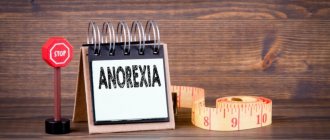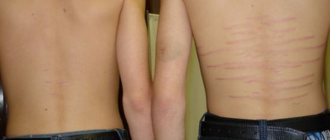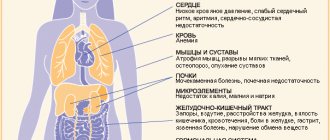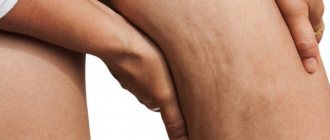What is anorexia?
Anorexia is an eating tract disorder that is accompanied by a sharp decrease in body weight due to insufficient nutrition. This disease mostly refers to psychological illnesses, since a person constantly thinks that he is overweight. Patients no longer see their true reflection in the mirror and continue to torture the body, often completely refusing to eat.
The fear of gaining weight greatly outweighs the feeling of hunger. People suffering from anorexia develop muscle atrophy and problems with hair and skin. Bones become fragile, teeth fall out, and nausea, weakness and dizziness are perceived as a normal state.
Treatment
Treatment of anorexia nervosa requires an integrated approach, which involves the use of medications and psychotherapy methods. An important condition for the patient’s recovery is the support of the immediate environment.
If symptoms of primary anorexia are detected, treatment must be carried out for the pathology that caused this disorder.
Therapy for the disease begins with dietary correction in favor of protein and easily digestible foods.
This is done to restore body weight. The food is well ground and given to the patient in small portions at intervals of 2-3 hours.
Drug therapy
In the treatment of anorexia nervosa, a complex of drugs is used, which are selected taking into account the characteristics of each case. If the patient has problems with the absorption of protein products, a solution of Polyamine or another drug with a similar composition is administered intravenously before meals. If necessary, place a drip with a nutrient mixture.
Due to the fact that many people suffering from anorexia artificially induce vomiting, it is necessary to inject 0.5 ml of a 0.1% Atropine solution subcutaneously half an hour before meals. After consuming food, the patient must be supervised to prevent his stomach from emptying.

To eliminate the consequences caused by anorexia, drugs are used that restore the water-salt balance, the level of potassium and other useful microelements. Antidepressants for anorexia (Fluoxetine, Paxil, Zoloft and others) are prescribed if the disease is caused by mental disorders or provoked their occurrence. In some cases, treatment is limited to taking sedative medications. Hormonal medications are often recommended for teenagers.
Psychotherapy
Anorexia nervosa necessarily requires psychological help. This is explained by the fact that patients are not aware of the presence of the disease. Only voluntary therapy produces positive results.
Psychotherapeutic assistance involves the doctor changing a person’s attitude towards his own appearance, weight, and food. Close relatives are often involved in the treatment of adolescents.
One of the elements of psychotherapy is the restriction of the patient's freedom.
Patients are treated in a hospital setting, where they cannot take long walks and are required to follow doctor’s orders. If patients comply with the requirements, a reward is provided, selected individually in each case.
Folk remedies
For symptoms of anorexia nervosa, treatment with traditional medicine is selected depending on the stage and causes of the disease. Infusions that improve appetite are shown:
- from calamus root;
- from dandelion root;
- cornflower flowers;
- wormwood.

The disease causes nutritional deficiencies. To eliminate their deficiency, recipes that contain fruits and vegetables are used. The rest of the pathology is treated through medications and psychocorrection.
How to recognize the disease?
In the early stages, the disease is easier to identify and treatment will be more effective. After all, anorexia often ends in death, that is, death.
So, the first symptom is that a person begins to eat less. Whenever possible, he uses every possible means to get rid of food. Skin color changes, eyes become sunken - all due to poor blood circulation and insufficient nutrients. Exhaustion of the body leads to sudden and noticeable weight loss.
Hormonal imbalance and menstrual irregularities (complete absence of menstruation) are the main signs of anorexia in women.
The patient may also experience:
- Weakness and fatigue.
- Fainting.
- Anemia.
- Dehydration.
- Depression and irritability.
- Paranoid state caused by “excess” weight.
- Anxiety while eating, especially in the presence of other people.
- Low self-esteem, increased self-criticism and demands on oneself.
Anorexia: symptoms, signs
The causes of anorexia can be very different: from diabetes to alcoholism and severe mental disorders. Most often, people suffering from this disease have low self-esteem, they are subject to constant stress and depression, and the development of various phobias is observed.
Most patients are girls and women who strive to get an ideal body. The main signs of anorexia in girls are dissatisfaction with their figure, sudden weight loss, etc. Constant diets and fasting, physical activity for them is the main way to combat “pseudo-obesity.”
Anorexia can also be caused by:
- Chronic diseases that are accompanied by loss of appetite.
- Metabolic disorders, lack of hormones.
- Diseases of the digestive tract (liver cirrhosis, hepatitis, gastritis).
- Kidney failure.
- Long-term use of antibiotics or other medications.
Anorexia occurs mainly in young people and also in children. The first signs of anorexia are a serious cause for concern. Examination by a specialist and immediate therapy will help avoid serious consequences.

Causes
The true and nervous forms of the disease develop under the influence of various factors. The causes of true anorexia are:
- diabetes;
- infectious pathologies of a chronic nature;
- helminthic infestation;
- diseases of the gastrointestinal tract;
- cancer (lymphoma, sarcoidosis and other types);
- renal failure;
- persistent and prolonged increase in body temperature;
- taking glucocorticosteroids;
- dental diseases;
- nervous disorders (neuroses, schizophrenia, phobias);
- thyrotoxicosis.

In addition to these reasons, anorexia develops under the influence of the following factors:
- brain injuries;
- necrosis of brain tissue;
- toxic damage;
- aneurysms of intracranial arteries;
- brain irradiation;
- neurosurgical operations.
The nervous type of the disease appears when:
- increased sensitivity, pedantry, stubbornness and other personality traits;
- frequent pathologies of the digestive system;
- the desire to imitate fashion;
- features of the anatomical structure of the body.
One of the main factors in the onset of the disease is considered to be improper upbringing in combination with personality traits. Moreover, the main role is assigned to the behavior of the mother towards her daughter in adolescence.
Overprotection and oppression of the individual provoke the child’s desire to stand out from others and to assert himself. One of the ways to achieve this goal is the desire to improve your appearance, to look slim. This behavior leads to the development of inferiority complexes, which is why teenagers begin to control and limit their food consumption.
Constant hunger acts as an obstacle that must be overcome in order to strengthen the will. Having passed such a “test”, the teenager feels like an adult, capable of solving other problems. In fact, such aspirations allow a person to feel like an accomplished person. But if a teenager experiences difficulties in other areas of life, then control over food increases.
Three stages of the disease
Exhaustion of the body due to chronic malnutrition and starvation causes serious illness and no less serious consequences.
Anorexia develops in several stages.
- Dysmorphomaniac. Characterized by low self-esteem regarding one’s appearance, in particular, one’s figure. Constant thoughts about obesity are accompanied by decreased appetite and starvation. The first signs of anorexia are strict diets and starvation.
- Anorectic stage. After some time, after prolonged dieting, a sharp weight loss is observed. A person experiences euphoria, delight from such results. He continues to exhaust his body even more.
- The cachectic stage is an irreversible degeneration of internal organs. This period begins approximately two years after strict diets. A person’s weight decreases by half, the body’s water balance is disrupted, and potassium levels drop. Often this condition can no longer be treated - the functions of all organs are inhibited, which can lead to the death of the patient.
Consequences of the disease
The most terrible consequence of the disease is the irreversible degeneration of all internal organs, after which they lose their vital functions. Of course, it is better not to bring your body to an extreme state.
However, anorexia does not always end in death. Sometimes patients, having achieved certain results in losing weight, stop.
One way or another, the consequences of the disease will not pass without leaving a trace.
- Violation of digestive functions leads to gastritis, ulcers, and, worse, to cancer.
- In women, hormone levels decrease, menstruation stops, as a result of which the body is more susceptible to diseases of the reproductive system.
- Low calcium levels lead to brittle bones, loss of teeth, hair, and skin problems. It will take years to recover.
- The body's protective functions decline and the immune system weakens.
- Brain function is disrupted - a person becomes forgetful and nervous.
All signs of anorexia that were ignored and not treated at the initial stage often become the beginning of very terrible and incurable diseases.

How to treat?
First of all, it should be remembered that the disease occurs at the mental level. Therefore, in addition to proper nutrition, consultations with psychologists are necessary. In other words, the treatment of anorexia is a complex therapy that consists of two stages - physical recovery and psychotherapy.
Experts prescribe a balanced, high-calorie diet, as well as medications that stimulate appetite. Food should be taken in small portions. It is possible to use medications such as Chlorpromazine, Amitriptyline, Cyproheptadine. There are often cases when hypnosis is used for treatment. Sometimes the patient may also be prescribed strong antidepressants.
Folk remedies are also used. These are mainly decoctions and infusions of rowan, yarrow, mint, lavender, nettle, and oregano.
Anorexia in children
Most parents are very concerned about their child's appetite. Everything is delicious, everything is healthy - but the child, as luck would have it, refuses. Games of catching up with a spoon or feeding during a cartoon begin, which only makes the situation worse. There are often cases when a mother, suspecting anorexia in a child, tries to stuff as much food into him as possible, which causes hatred and aversion to food in the baby, independently programming the disease.
In fact, a child’s refusal to eat can be quite justified - the baby is sick, tired, he doesn’t like the food... When a child refuses food for a long enough time, then it’s time to “sound the alarm.” It should also be remembered that signs of anorexia in adolescents are accompanied by growth retardation. It is best to visit a specialist if you notice symptoms.
From preoccupation with appearance to anorexia
One of the most important periods in the development of the human psyche is the period of adolescence in a child. This is the time of transition from childhood to adulthood. And it is at this time that the child first encounters many “adult” problems.
The child learns to evaluate himself as an adult not only intellectually, but, first of all, from the outside.
At this time, among teenagers, more naturally than girls, the issue of appearance and comparison of themselves with adult standards of beauty comes to the fore. From the pages of women's magazines and television, teenage girls see unnaturally thin models and, starting to compare themselves with them, consider themselves incredibly fat and set themselves the goal of becoming the same.
In order to achieve this, girls begin to go on incredible diets, which, in addition to deteriorating the child’s physical health, can result in psychological problems such as anorexia or bulimia.
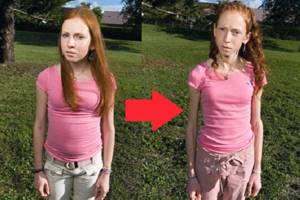
Losing weight correctly
Whatever one may say, even knowing the serious and sometimes irreversible consequences of anorexia, those obsessed with a slim figure will deplete their body with diets and starvation. However, diets can sometimes be beneficial. The main thing is to use them without fanaticism.
Rules for losing weight:
- You need to lose weight slowly. Weight that has been gained over the years cannot be lost in a few months.
- If you eat high-calorie foods, you need to engage in physical activity.
- Meals should be frequent, but in small portions.
- You should forget about fast food. Eat as if you are in a restaurant and there is no rush.
- Don't forget about vitamins and minerals.
A proper diet will not only help you lose weight, it will also have a beneficial effect on your health.
How do people with anorexia nervosa lose weight?
- These are large physical activities (hard work in production and in the garden) or active physical education and sports, fitness (running, training on exercise machines, sports dancing, so-called “circuit training”, etc.). Loads to the point of failure, to exhaustion, to stretching and rupture of tendons, to the development of pathological changes in the heart muscle
- A marked decrease in the amount of food consumed. First, patients with anorexia reduce and then completely eliminate meat and meat products, fish, and eggs from the diet. Then they refuse bread, cakes, pastries, sugar, pasta and others. As a result, girls (and they, as already written, make up the vast majority of patients with anorexia nervosa) “sit down” for a long time on a harsh dairy-vegetable diet, the calorie content of which is 400-800 kcal.
- If an extremely valuable idea appears about a “fat” belly, thighs, buttocks and other parts of the body, patients with Anorexia Nervosa begin to torture themselves with specially designed and invented exercises. Those suffering from anorexia nervosa refuse a sitting position and do everything standing (watch TV, read a book, etc.), reduce the time for sleep as much as possible, squeeze the stomach with belts and tourniquets (so that “food is absorbed longer”), search on the Internet for the most “effective” ways to lose weight"...
- Patients with anorexia often resort to all kinds of stimulants and medications - they drink large quantities of strong coffee instead of eating, smoke continuously, use medications that reduce appetite, diuretics and laxatives, and do enemas.
- Often, those suffering from anorexia nervosa vomit immediately after eating, which leads to the rapid consolidation of this “method” of losing weight and the development of an obsessive, irresistible desire to vomit after any meal (vomitomania). Long-term use of this “method” causes new health problems - destruction of tooth enamel, development of caries, stomatitis and gingivitis, and the appearance of erosions (ulcers) on the mucous membrane of the esophagus.
